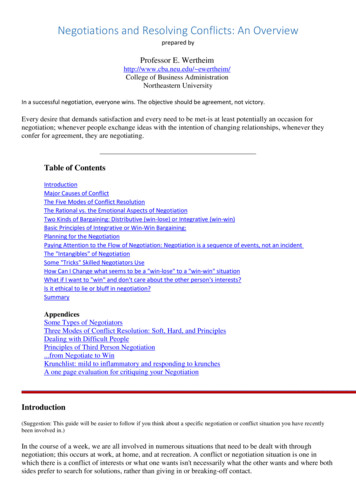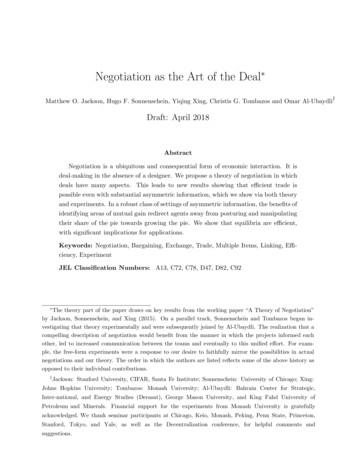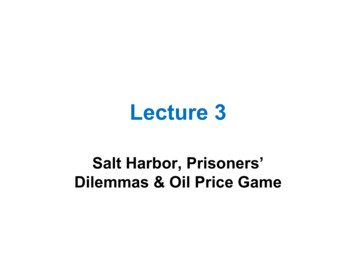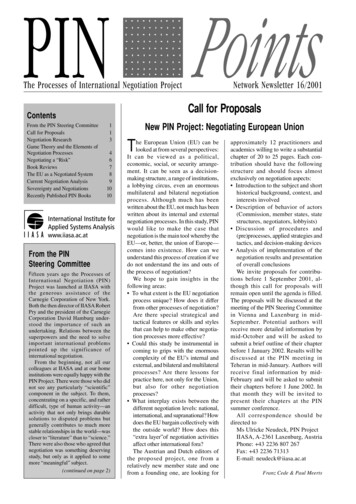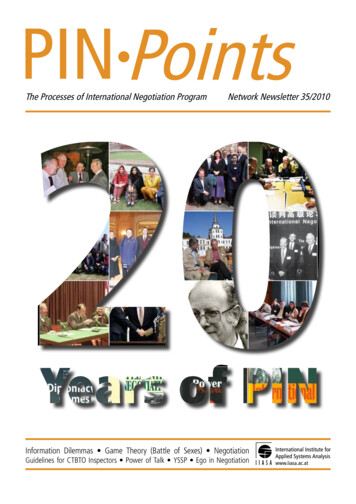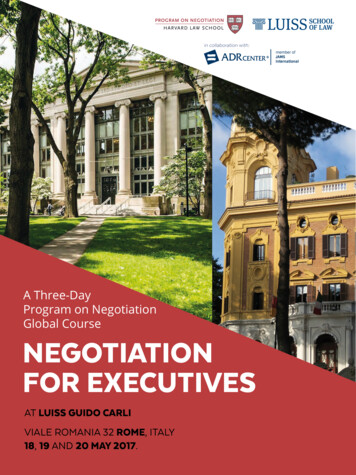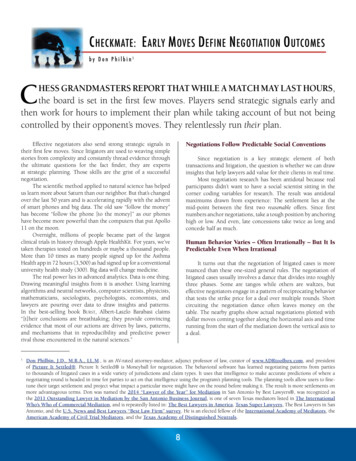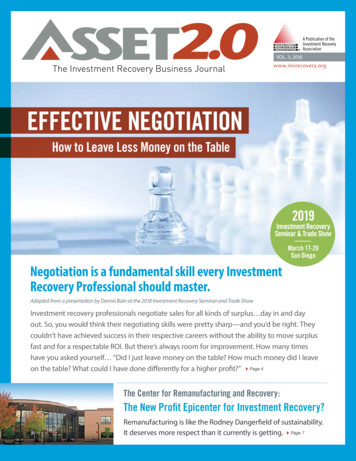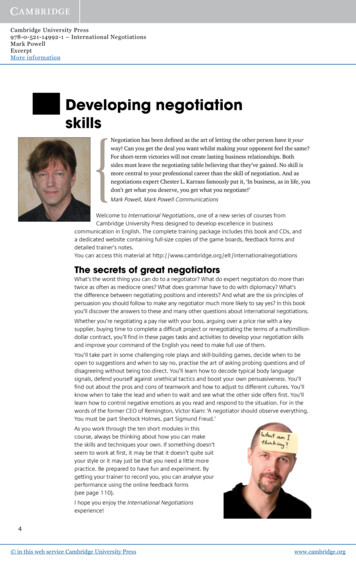
Transcription
Cambridge University Press978-0-521-14992-1 – International NegotiationsMark PowellExcerptMore informationDeveloping negotiationskillsNegotiation has been defined as the art of letting the other person have it yourway! Can you get the deal you want whilst making your opponent feel the same?For short-term victories will not create lasting business relationships. Bothsides must leave the negotiating table believing that they’ve gained. No skill ismore central to your professional career than the skill of negotiation. And asnegotiations expert Chester L. Karrass famously put it, ‘In business, as in life, youdon’t get what you deserve, you get what you negotiate!’Mark Powell, Mark Powell CommunicationsWelcome to International Negotiations, one of a new series of courses fromCambridge University Press designed to develop excellence in businesscommunication in English. The complete training package includes this book and CDs, anda dedicated website containing full-size copies of the game boards, feedback forms anddetailed trainer’s notes.You can access this material at ionsThe secrets of great negotiatorsWhat’s the worst thing you can do to a negotiator? What do expert negotiators do more thantwice as often as mediocre ones? What does grammar have to do with diplomacy? What’sthe difference between negotiating positions and interests? And what are the six principles ofpersuasion you should follow to make any negotiator much more likely to say yes? In this bookyou’ll discover the answers to these and many other questions about international negotiations.Whether you’re negotiating a pay rise with your boss, arguing over a price rise with a keysupplier, buying time to complete a difficult project or renegotiating the terms of a multimilliondollar contract, you’ll find in these pages tasks and activities to develop your negotiation skillsand improve your command of the English you need to make full use of them.You’ll take part in some challenging role plays and skill-building games, decide when to beopen to suggestions and when to say no, practise the art of asking probing questions and ofdisagreeing without being too direct. You’ll learn how to decode typical body languagesignals, defend yourself against unethical tactics and boost your own persuasiveness. You’llfind out about the pros and cons of teamwork and how to adjust to different cultures. You’llknow when to take the lead and when to wait and see what the other side offers first. You’lllearn how to control negative emotions as you read and respond to the situation. For in thewords of the former CEO of Remington, Victor Kiam: ‘A negotiator should observe everything.You must be part Sherlock Holmes, part Sigmund Freud.’As you work through the ten short modules in thiscourse, always be thinking about how you can makethe skills and techniques your own. If something doesn’tseem to work at first, it may be that it doesn’t quite suityour style or it may just be that you need a little morepractice. Be prepared to have fun and experiment. Bygetting your trainer to record you, you can analyse yourperformance using the online feedback forms(see page 110).I hope you enjoy the International Negotiationsexperience!4 in this web service Cambridge University Presswww.cambridge.org
Cambridge University Press978-0-521-14992-1 – International NegotiationsMark PowellExcerptMore informationNegotiating and youTake a few moments before you begin the course to think about your own needs and experience as a negotiator.Tick the comments that apply to you below and see how International Negotiations can help you to improve.I’ve had some experience of negotiatingin my own language, but I’m not sosure I can translate that into English!Each module of the course contains the key words, phrasesand expressions you need to negotiate fluently in English.You’ll also learn some of the subtle language patternsskilled negotiators use to secure a deal.I’ve never really negotiated before –not even in my own language!You’ve probably negotiated a lot more often than youthink, but the course brings together some of the world’sleading negotiation experts to share their insights with you.Full notes in the Key and commentary guide you towards abetter understanding of how to negotiate.I know how negotiators in my owncountry like to do business, but I’m notso familiar with the procedure in othercountries. How do I prepare for theunknown?In many of the modules, people from different countriescompare how they prefer to negotiate. Module 3addresses how to establish a mutually acceptableprocedure. And the CDs contain recordings of negotiatorsof different nationalities in action.I’m OK at negotiating one-on-one, butI’m not clear about how to take part inmore formal team negotiations.Having a specific role within a negotiating team isessential. You should also make sure your skills and knowhow complement those of other team members. Module 1helps you to define your role.I’m never really sure how important itis to build rapport with the other partybefore negotiating with them. Isn’t itbetter just to stick to business?How much of a relationship you need to build beforenegotiations begin or whether you can leave the smalltalk till the end will depend on who you’re negotiatingwith. Module 2 develops your ‘cultural intelligence’ andconversation skills.Procedures and protocols are all verywell, but in the end it always comesdown to figures! How soon do Imention money, how much should Iconcede and how exactly do I closethe deal?Bargaining is one of the prime skills in negotiation. Ideally,you want to explore options without committing yourselftoo soon, you want a win–win outcome and you wantpractical alternatives if you fail to reach a deal. Module4 deals with how to package your proposals. Module 7shows you how to attach conditions to those proposalsand trade concessions strategically. Module 10 modelsdifferent ways of wrapping up the deal.I think negotiating in a foreignlanguage must increase the chances ofmiscommunication.Of course, misunderstandings are more likely to occurwhen speaking a foreign language, but the toolbox ofclarification techniques in Module 5 will help you toovercome, and even take advantage of this.I don’t know how good I am atpersuading other people. Is thereanything I can do to be morepersuasive?There are certainly some basic principles you can applyto become more persuasive. Module 8 deals with thesein detail. But, rather than simply trying to persuade theother party, focus on uncovering the reasons behind theirposition and then generating options that satisfy the realneeds of both sides. Module 6 systematically builds up yourquestion power and creative thinking.I’m not very comfortable dealing withconflict and high-pressure tactics innegotiations.Some negotiators like to play tough, but meeting forcewith force rarely resolves anything. Module 8 teachesyou self-defence against the most common high-pressuretactics. Module 9 shows you how to move things forwardwhen a negotiation is deadlocked.I’m concerned that if discussionsbecome heated, I myself might comeacross as too direct in English.Fortunately, there are certain language choices you canmake which allow you to be clear and assertive withoutsounding hostile. Module 9 introduces you to thelanguage of directness and diplomacy.5 in this web service Cambridge University Presswww.cambridge.org
Cambridge University Press978-0-521-14992-1 – International NegotiationsMark PowellExcerptMore information1A Preparing to negotiateThe majority of business negotiators do not spend adequate time preparingfor negotiations. It is a well-established fact that professional sports peoplespend significantly more time preparing for competition than they spend incompetition. Should it be any different for business negotiators?Jan Potgieter, founder and CEO of Business Negotiation Solutions1 How far do you agree with Jan Potgieter that most negotiators under-prepare?As a group, brainstorm the sort of preparations you’d need to make for aninternational negotiation – think, for example, about goals, alternatives,background research, team-building, venue selection and cultural factors.2 Define ‘negotiation’ in a sentence. Then compare definitions with the rest of your group.3 The flowchart below shows the principal stages and sub-stages of a formal negotiation.With a partner, complete the different sections using the verbs in the boxes. Fill in thecentral part of the chart first.statecallworkexploreattachcreatedecidea goodatmospherewho will speak firstyour openingmakeagreeprobe13enterresolveconditions to your5for a time-outout the detailsclarifygenerateproposalsand counter-offerspositionanything you don’tunderstandthebargaining zoneany areasof conflictthenegotiationsetthe other side’swith7summarisetradeout the points tobe discussed6findthings in commonon derapport2positioneach other’sbuildconcessionsfurther optionsthe deal!6 in this web service Cambridge University Presswww.cambridge.org
Cambridge University Press978-0-521-14992-1 – International NegotiationsMark PowellExcerptMore information4 How much do you think negotiating procedure varies from culture to culture? Are thestages listed in 3 sequenced differently or given greater or lesser importance in thecultures you mostly do business with?51.02–1.04 Listen to an intercultural communication trainer describing three broadcultural types and tick the notes on negotiation styles which apply.1 FACT CULTURESa Aim for a long-lasting businessrelationshipb Minimise the social chit-chatc Plan meetings thoroughly inadvanced Like to connect up all the factse Expect you to have done yourhomeworkf Are initially sceptical about doingbusiness with youg Always make quick decisionsh Like to keep track of thediscussion and what’s beenagreed so fari Want some kind of result at theend of the meeting2 PEOPLE CULTURESly to thea Tend to respond badl’selrd‘haDon’t like to be rushedwho expect tob Are good listenersllweastodInsist on their own agendabe listeneclearlyandeTend to discuss topics in a fairlyc Put forward precisssalporandom orderdefined propect youKnow what they want int emotional if they susGedhyadvanceare not trustwortMake quick, instinctive decisions e Give direct answers to directas they go alongquestionsing until you hitKeep introducing new elementsf Will keep you guesswantinto the negotiationon what it is they reallysubtlyTry not to upset anyoneg Reveal their interestsdecisionUsually postpone a finalh Are notoriously slowdecision until more meetingsmakershave been heldbe bindingi Expect contracts toa Take a while to get down tobusinessbcdefghi3 TRUST CULTURES6 What nationalities do we tend to associate with the descriptions in 5? How accurate arethose associations? Discuss some false stereotypes you’ve discovered.7 Now work with a partner to match the negotiations advice below to the cultural types in 5.a Have plenty of supporting data.1j Interrupt politely and seldom.b Avoid conflict – be diplomatic.k Never interrupt – be patient and listen.c Feel free to give your opinions.l Be flexible about time.d Try to think long term.m Stick to the agenda.e Work hard to be liked.n Try to ‘read between the lines’.f Stay focused on your business goals.o Don’t reveal too much too soon – wait.g Think aloud, digress, be creative.p Don’t be afraid to show your emotions.h Say what you mean – don’t be vague.q Don’t commit yourself to anything.i Interrupt immediately if you need to.r End with a list of action points.8 Work with a partner. Turn to page 80to learn some useful expressions forthe different stages of a negotiation.7 in this web service Cambridge University Presswww.cambridge.org
Cambridge University Press978-0-521-14992-1 – International NegotiationsMark PowellExcerptMore information1B Preparing to negotiateComplex negotiations may require several participants. But if teamnegotiating is to be truly effective, each team member must play aspecific role. Key roles include: a chief negotiator, a decision-maker,a facilitator and an observer. But make sure you get the right mix –if two people are playing the same role, you’ve got one team membertoo many!Galina Ivachev, Customer Service Manager, Skycom Courier and CargoCompany (United Arab Emirates)1 What do you think would be the main contribution of each member of theteam Galina Ivachev mentions? What other roles might team members adopt?Could any of these be combined?2 Complete the team roles model below using the pairs of words in the box.breaks solutionsnotes calculationsamonitors movementconciliates clarificationoverallstrategy and has the. Decision-makerfinalformulates authorityconducts spokespersonoftheir team’s position.c3downkey figures and does.theFacilitatorTEAMROLESNumber-cruncherthe mainnegotiations and acts as.etheother team’s behaviourand looks for signs of.fdeadlocksby coming up with.creativeChief negotiatorband providesdObserverIdeas-generator1.05 Now listen to short extracts from an international negotiation and decide which ofthe six team members you think you are listening to.Extract 1:Extract 4:Extract 2:Extract 5:Extract 3:Extract 6:4 What are the pros and cons of team negotiation and one-on-one deals? When is itadvisable to negotiate as a team and when is it better to negotiate alone? With a partner,complete the table below. Then present your ideas.ProsProsConsConsWhen?When?8 in this web service Cambridge University Presswww.cambridge.org
Cambridge University Press978-0-521-14992-1 – International NegotiationsMark PowellExcerptMore information5 Compare your views in 4 with those of Elizabeth Mannix, Professor of Management andOrganisations, Cornell University, in the article below.Negotiatingas a teamThe widespread belief in ‘strength innumbers’ suggests that having moreplayers on your team should be a benefit,not a burden. But this belief can lead teammembers to under-prepare for negotiation,a common mistake. Think about the timesduring a negotiation when you wishedyou could retract a concession or bit ofinformation that slipped out of a teammate’smouth.When teamwork is the best optionBringing a team to the table offers severalbenefits. Teams stimulate more discussionand more information sharing thanindividuals do, particularly concerninginterests, issues and priorities. Teams alsofeel more powerful and advantaged thansolo negotiators. Even in highly stressfulsituations, team negotiators feel lesscompetitive and pressured. With greaternumbers comes a greater sense of security.However, the promise of teams can eludeus. Suppose one team member has stronganalytical skills, another has vast technicaland industry knowledge and a third hasstrong relationship-building skills. Theseingredients should add up to a formidableteam, but, if members disagree on key issues,they are unlikely to take advantage of theirdiffering skills.When to use a teamWorking as a team can be particularlybeneficial in the following situations:1 the negotiation is complex, requiringa diverse set of knowledge, abilities orexpertise2 the negotiation has great potential forcreative solutions3 diverse interests must be represented atthe table, as in union negotiations4 you want to display your strength to theother side, for example, in internationalcontexts, where teams are expected5 you want to signal to the other side thatyou take the negotiation very seriously, asin a merger or acquisition6 you trust and respect available teammembers7 you have sufficient time to organize andcoordinate a team effort.Elizabeth A. Mannix, Cornell UniversitySource: Elizabeth A. Mannix, Negotiation, Vol. 8, No. 5, Harvard Business School Publishing6 Have you ever experienced any of the following? A team member let you down.You disagreed with your team on some of your key objectives.Your team had exactly the right mix of skills and expertise to be effective.A creative solution was jointly worked out that you couldn’t have reached alone.Briefly tell the story.7 What’s a dream team? Work with a partner. Turn topage 81 to practise putting together a dream teamfor an upcoming international negotiation. You canuse the online feedback form to evaluate eachother’s skills.8 Compare your team structure with other pairsand then look at page 61.9 in this web service Cambridge University Presswww.cambridge.org
Cambridge University Press978-0-521-14992-1 – International NegotiationsMark PowellExcerptMore information2A Relationship-buildingNever do business with anybody you don’t like.If you don’t like somebody, there’s a reason.Harry Quadracci, founder of Quad/GraphicsBusiness relationship-building is all about thefact that it’s you they buy. Clearly, they areinterested in what your company has to offeror you wouldn’t be having meetings withthem in the first place, but for the duration ofthose meetings you are the company.Graham Bennett, Impact Factory1 Consider what two negotiation experts say about the importance of building a goodrelationship with the other party and discuss the following points with a partner:a How important is it to be liked by the people you negotiate with?b To what extent does it depend on whether you expect to do business with them again?c To what extent does it depend on how much you need their goodwill to implement youragreement?d Would you ever do business with someone you disliked? Could you afford not to?2 Sometimes, when you want something, you justhave to go for it! In the comic movie Jingle All TheWay, Arnold Schwarzenegger plays the part of anover-worked father determined to buy his son thisyear’s most popular toy for Christmas. But the storeshave almost sold out and another desperate fatheris after the same toy!Work with a partner. You are going to try tonegotiate your way out of the same dilemma.Turn to page 82.3 How did your negotiation go? Did you find yourselfdoing any of the following:arguing?bullying?just grabbing the toy?refusing to discuss the issue?trying to justify yourself?just giving in?using emotional blackmail?4 Now repeat the negotiation you had in 2. But first, find out what has changed about thesituation. Speaker 1 turn to page 82 and Speaker 2 turn to page 104.5 How was your negotiation different the second time? Think about your tone of voice,how you started off and how you ended your conversation. Did you manage to reach anagreement?10 in this web service Cambridge University Presswww.cambridge.org
Cambridge University Press978-0-521-14992-1 – International NegotiationsMark PowellExcerptMore information6 Read the analysis of the activity you have just done on page 82. Then, without lookingback at the text, see, with a partner, how many of the following terms you can remember:single-issue negotiationzero-sum gamereach a deadlock7go head to headone-off deal1.06 Fons Trompenaars is one of the world’s leading experts on doing business acrosscultures. Listen to an intercultural communication trainer commenting on his views aboutrelationship-building and label the diagrams below.-context (e.g.)-context (e.g.)Fons ManagementGroupfirstGet to know yourGet straight down to-term viewTake a moretoMove fromThink more-termMove fromto8 Now discuss the following questions with a partner:a Which of the two cultural types is less likely to waste time socialising with people who arenot really interested in doing business?b Which cultural type is less likely to sign a contract with people who turn out not to betrustworthy?c Which cultural type may be slightly more resistant to foreigners?d Is your culture high- or low-context? How typical are you of your culture?91.07 You are going to listen to the opening minutes of a negotiation between anAmerican team (low-context) and a Mexican team (high-context). Which of the behaviourpatterns below do you think they’ll display? Mark them L or H. Then listen an
more central to your professional career than the skill of negotiation. And as negotiations expert Chester L. Karrass famously put it, ‘In business, as in life, you don’t get what you deserve, you get what you negotiate!’ Mark Powell, Mark Powell Communications Welcome to Intern
